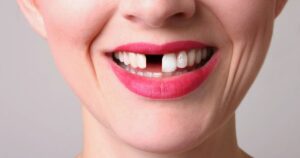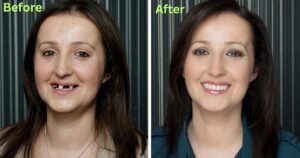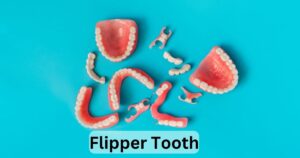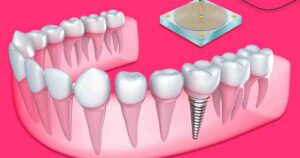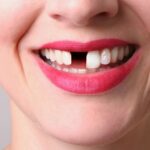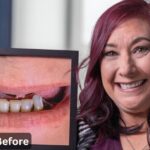Understanding Permanent Dentures encompasses a transformative solution in modern dentistry, offering a long-term remedy for tooth loss. These prosthetic dental appliances, unlike traditional removable dentures, provide a fixed, stable, and lasting replacement for missing teeth.
Whether in the form of implant-supported dentures or fixed partial bridges, permanent dentures aim to restore not just the aesthetics but also the functionality of a natural smile. This comprehensive guide delves into the diverse types of permanent dentures, their benefits, the procedural aspects of acquiring them, and the maintenance required.
Exploring the nuances of these prosthetics reveals their pivotal role in revitalizing oral health and reinvigorating confidence. Embracing the advancements in dental technology, this guide illuminates the transformative impact and considerations associated with opting for permanent dentures as a restorative dental solution.
Types of Permanent Dentures
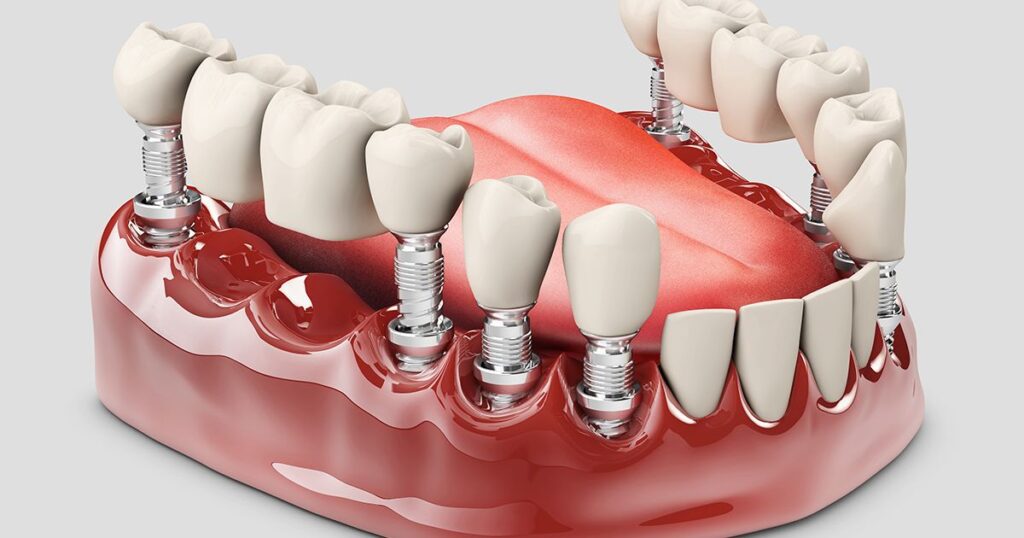
Certainly! There are several types of permanent dentures designed to address different degrees of tooth loss and dental needs:
Fixed partial dentures
Fixed partial dentures, commonly known as dental bridges, serve as a non-removable option for replacing missing teeth. They bridge the gap created by one or more missing teeth by anchoring artificial teeth to adjacent natural teeth or dental implants. This fixed restoration enhances both aesthetics and functionality, restoring the natural appearance of the smile and facilitating improved chewing and speaking abilities.
Implant-Supported Dentures
Implant-supported dentures offer a secure and stable solution for those missing a complete set of teeth. Utilizing dental implants as anchors, these dentures are securely attached to the jawbone, providing a more natural feel and enhanced stability compared to traditional dentures. They offer exceptional durability, comfort, and a significantly improved chewing experience.
Fixed Full Dentures
Fixed full dentures, also known as fixed complete dentures, are a comprehensive solution for replacing an entire arch of missing teeth. These dentures are permanently affixed to dental implants, ensuring optimal stability and function while restoring a complete set of teeth. Fixed full dentures offer excellent support, eliminating concerns about slippage or discomfort associated with traditional removable dentures.
Each type of permanent denture presents unique advantages, catering to varying degrees of tooth loss and individual patient needs for a reliable, lasting dental restoration.
Benefits of Permanent Dentures
The benefits of permanent dentures extend beyond mere tooth replacement, offering individuals a range of advantages:
Enhanced Stability and Functionality
Permanent dentures offer enhanced stability and functionality, particularly notable in implant-supported options. The secure integration with the jawbone ensures steadfastness, allowing for confident chewing, speaking, and normal oral function. Compared to traditional removable dentures, this stability eliminates concerns of slippage or dislodgment, offering a more natural feel.
Implant-supported dentures closely mimic the sensation of natural teeth, providing a secure foundation that enhances comfort and usability. This improved stability not only bolsters oral functionality but also instills confidence, allowing individuals to engage in daily activities without worry or discomfort, fostering a better quality of life.
Improved Aesthetics
Permanent dentures elevate aesthetics by mimicking the natural appearance of teeth, enhancing facial harmony and restoring a confident smile. Whether through fixed partial dentures, implant-supported options, or full arch replacements, these prosthetics seamlessly blend with existing teeth or gums.
Their lifelike design not only revitalizes self-confidence but also positively influences facial contours, imparting a youthful look. The restoration of a complete set of teeth significantly impacts overall facial aesthetics, ensuring a natural, comfortable, and visually pleasing smile that radiates confidence and restores a sense of personal well-being.
Long-Term Durability
Long-term durability is a hallmark of permanent dentures, particularly implant-supported solutions. These dentures offer exceptional resilience and endurance, minimizing the need for frequent replacements or adjustments. Being firmly affixed or supported by implants, they withstand daily wear and tear, maintaining their functionality and appearance over an extended period.
This durability not only ensures a longer lifespan but also provides patients with a reliable, lasting dental restoration. With proper care and maintenance, permanent dentures exhibit remarkable longevity, offering individuals a reliable solution for tooth replacement that can endure for many years, enhancing oral health and quality of life.
Preservation of Jawbone Health
The preservation of jawbone health is a significant benefit associated with permanent dentures, particularly implant-supported options. Dental implants used in these dentures mimic natural tooth roots, stimulating the jawbone just like natural teeth. This stimulation helps prevent bone loss that commonly occurs with tooth loss, preserving the density and structure of the jawbone.
By maintaining bone integrity, permanent dentures support facial contours, prevent deterioration of surrounding teeth, and contribute to overall oral health. This preservation of jawbone health ensures a stable foundation for the dentures, promoting long-term stability and functionality while preventing potential oral health issues caused by bone resorption.
Enhanced Comfort
Enhanced comfort is a key advantage of permanent dentures, offering a superior level of comfort compared to traditional removable dentures. Implant-supported or fixed options provide a secure and stable fit, eliminating issues related to movement or slippage that may cause discomfort.
With their snug and secure placement, permanent dentures alleviate concerns about loose fittings or sore spots, enhancing overall comfort during daily activities like eating, speaking, and smiling. The natural feel and stability provided by these dentures contribute to a comfortable and confident experience, allowing individuals to enjoy their restored smile without the discomfort often associated with removable dentures.
Efficient Chewing and Speech
With increased stability, these dentures enable efficient chewing of various foods and facilitate Permanent dentures significantly improve chewing and speech functions compared to traditional removable dentures. With their stable and secure placement, particularly implant-supported or fixed options, these dentures offer efficient chewing abilities, allowing individuals to comfortably consume a variety of foods.
Their stability minimizes concerns about denture movement or slippage, enabling efficient and confident chewing. The secure fit and stability positively impact speech, ensuring clearer articulation and pronunciation. By eliminating concerns related to loose dentures affecting speech patterns, permanent dentures enhance both chewing efficiency and speech clarity, contributing to improved overall oral function and confidence in daily interactions.
speech without impediments.
The advantages of permanent dentures go beyond tooth replacement, significantly improving oral health, functionality, aesthetics, and overall quality of life for individuals with missing teeth.
The Process of Getting Permanent Dentures

The process of acquiring permanent dentures involves several steps aimed at providing patients with a long-lasting and effective dental solution. Initially, a consultation and evaluation with a dentist or prosthodontist are conducted to assess oral health, discuss treatment options, and determine suitability for permanent dentures.
For implant-supported dentures, the next phase involves implant placement or the preparation of the denture foundation. This step might require multiple appointments to surgically insert dental implants into the jawbone, allowing them to integrate and provide a stable base for the dentures.
Following this, a final fitting and adjustment phase ensure the dentures fit comfortably and securely. The dentist makes necessary adjustments to ensure optimal fit, functionality, and aesthetics. Throughout this process, patients are guided on proper care and maintenance, ensuring the longevity and success of their permanent dentures.
Comparing Permanent Dentures with Traditional Dentures
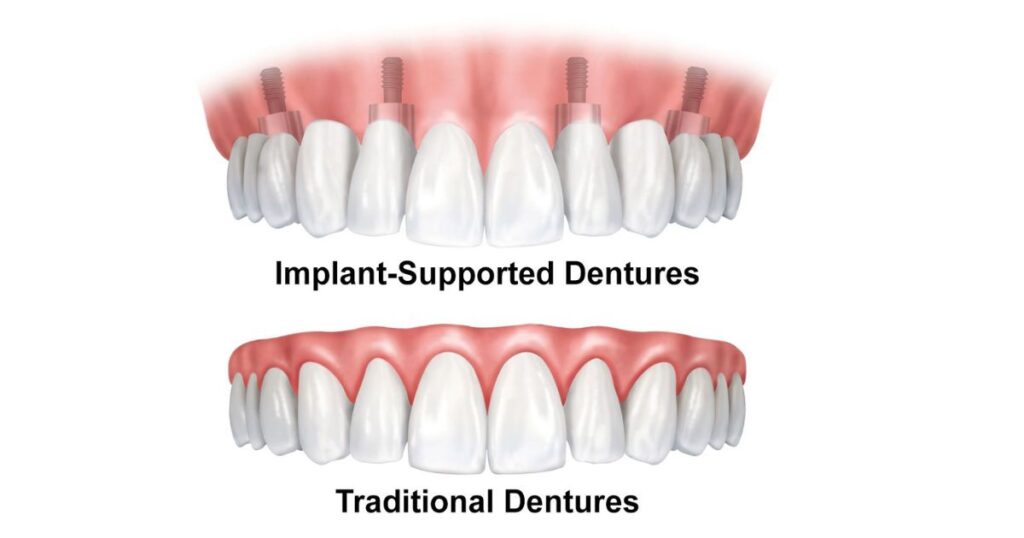
Certainly! Here’s a comparison chart outlining the differences between Permanent Dentures and Traditional Dentures:
| Aspect | Permanent Dentures | Traditional Dentures |
| Attachment | Fixed or implant-supported | Removable |
| Stability | Greater stability and security | Less stability, potential for movement |
| Durability | Long-term durability | May require periodic replacements |
| Bone Preservation | Stimulates jawbone, preserving it | May lead to bone loss over time |
| Comfort | Enhanced comfort, snug fit | May cause discomfort, sore spots |
| Chewing Efficiency | Efficient chewing abilities | Limited chewing efficiency |
| Speech | Clearer speech | May affect speech patterns |
| Maintenance | Less maintenance required | Regular cleaning and care necessary |
| Cost | Generally higher initial cost | Often more affordable initially |
| Treatment Duration | Several appointments for completion | Fewer appointments for fitting |
This chart highlights the key differences between permanent dentures, which offer stability, durability, and long-term benefits, and traditional dentures, which are removable but may come with limitations regarding stability and maintenance.
Cost Considerations and Insurance Coverage
Cost considerations and insurance coverage play pivotal roles in determining the feasibility of permanent dentures for individuals seeking tooth replacement options. The initial cost of permanent dentures, particularly implant-supported ones, tends to be higher compared to traditional removable dentures. This higher cost accounts for the advanced technology, materials, and multiple appointments involved in the process.
Insurance coverage for permanent dentures varies widely among providers and policies. While some dental insurance plans may cover a portion of the costs, coverage for implant-supported dentures might be limited or excluded. Patients should carefully review their insurance policies to understand coverage details and potential out-of-pocket expenses.
Exploring payment plans, financing options, and discussing cost-related concerns with dental professionals can assist in making informed decisions about the financial aspects of acquiring permanent dentures.
Maintenance and Care for Permanent Dentures
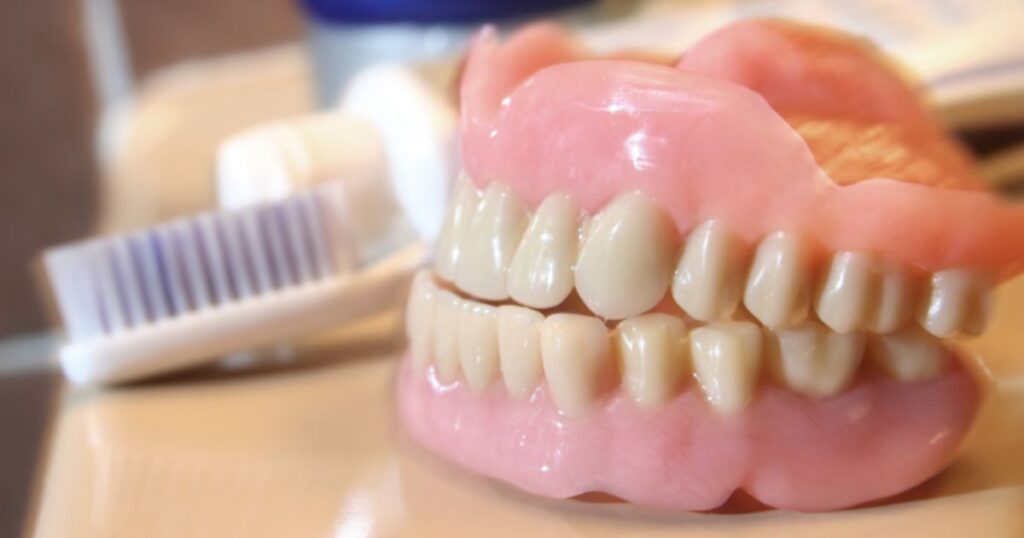
Maintenance and care for permanent dentures are essential to ensure their longevity and optimal functionality. Here are key practices:
Daily Cleaning: Brushing dentures with a soft-bristled brush and non-abrasive denture cleaner helps remove plaque and debris, maintaining oral hygiene.
Regular Rinsing: After meals, rinse dentures to eliminate food particles, preventing bacterial buildup and maintaining freshness.
Handle with Care: When handling dentures, do so over a soft surface or a folded towel to prevent damage if accidentally dropped.
Denture Soaks: Soaking dentures in a denture-cleaning solution or water overnight helps maintain their shape and cleanliness.
Regular Check-ups: Periodic dental visits allow dentists to examine dentures, ensuring proper fit, identifying potential issues early, and making adjustments as needed.
Avoiding Harsh Products: Refrain from using harsh or abrasive cleaning materials, hot water, or bleach, as they can damage denture surfaces.
Mouth Care: Cleaning the gums, tongue, and palate regularly helps maintain overall oral health, preventing infections and maintaining a healthy mouth environment for denture placement.
Following these maintenance practices and seeking professional guidance ensure that permanent dentures remain in good condition, providing comfort, stability, and functionality for an extended period.
Who Is a Suitable Candidate for Permanent Dentures?
Suitable candidates for permanent dentures are individuals with multiple missing teeth or those seeking a long-term tooth replacement solution. Specifically, those who:
Require Stability: Individuals seeking a stable and secure tooth replacement option, especially those experiencing challenges with traditional removable dentures due to slippage or discomfort.
Good Oral Health: Candidates with good overall oral health, sufficient jawbone density, and healthy gums are typically better suited for permanent dentures, particularly implant-supported options.
Missing Multiple Teeth: Those missing several teeth or a complete dental arch may benefit from permanent dentures, providing a comprehensive solution for restoring oral function and aesthetics.
Commitment to Oral Care: Candidates willing to commit to proper maintenance, regular dental check-ups, and good oral hygiene practices necessary for the longevity of permanent dentures.
Healthy Bone Structure: Individuals with adequate jawbone density or those eligible for bone augmentation procedures to support dental implants for permanent dentures.
Consultation with a qualified dentist or prosthodontist is crucial to assess an individual’s oral health, bone structure, and specific needs to determine candidacy for permanent dentures.
Potential Risks and Considerations
When considering permanent dentures, there are certain potential risks and considerations individuals should be aware of. While these dentures offer numerous benefits, especially in stability and functionality, there are associated risks such as the possibility of surgical complications with implant placement, including infection, nerve damage, or inadequate bone integration.
Some individuals might experience minor discomfort or soreness during the adjustment period after denture placement. Maintenance of permanent dentures is crucial, and improper care may lead to oral health issues. Moreover, not all candidates might be suitable due to factors like insufficient bone density, which can impact the success of dental implants.
Understanding these risks, undergoing thorough consultations, and following post-treatment instructions can mitigate potential complications, ensuring a more successful and comfortable experience with permanent dentures.
Advancements and Innovations in Permanent Denture Technology
Advancements in permanent denture technology continue to revolutionize tooth replacement solutions. Innovations, particularly in implant materials and techniques, enhance the durability and integration of dental implants into the jawbone, reducing healing times and improving overall success rates.
Advanced 3D imaging and CAD/CAM technologies enable precise planning and customization, ensuring optimal fit and aesthetics of permanent dentures. Additionally, innovative materials like high-strength ceramics and hybrid composites offer enhanced durability and natural aesthetics, elevating the comfort and longevity of permanent dentures.
These advancements underscore a shift toward more efficient, durable, and patient-centric solutions in modern dentistry, providing improved outcomes for individuals seeking long-term tooth replacements.
Pros and Cons
Certainly! Here’s a chart outlining the pros and cons of permanent dentures:
| Pros | Cons |
| Enhanced Stability: | Higher Initial Cost: |
| Provides superior stability and functionality, especially with implant-supported options. | Implant-supported dentures often have a higher initial expense. |
| Durability: | Surgical Procedures: |
| Long-lasting, durable solutions that reduce the need for frequent replacements. | Implant placement involves surgical procedures, which might pose some risks. |
| Improved Comfort: | Potential Complications: |
| Offers enhanced comfort, eliminating issues related to movement or sore spots often experienced with removable dentures. | Possibility of surgical complications, such as infection or inadequate bone integration. |
| Enhanced Aesthetics: | Maintenance Requirements: |
| Provides a natural-looking smile, closely resembling natural teeth, enhancing overall facial aesthetics. | Requires diligent maintenance and regular dental visits for optimal performance. |
| Preservation of Jawbone: | Not Suitable for Everyone: |
| Stimulates jawbone, preserving bone density, and maintaining facial structure. | Not all individuals might be suitable candidates due to factors like bone density or health conditions. |
This chart illustrates the advantages and disadvantages of permanent dentures, highlighting their benefits in stability, durability, and comfort while acknowledging considerations such as cost, maintenance, and candidacy.
FAQ’s
What do I need to know about permanent dentures?
Permanent dentures are an alternative to removable dentures for missing teeth. Unlike traditional dentures, permanent dentures are typically held in place by two or more surgically-placed dental implants, making them stable and allowing the patient to chew, talk, and smile more easily than with removable dentures.
What are the problems with permanent dentures?
Can Be Difficult to Clean and Maintain. Cleaning and maintaining permanent dentures can be a difficult process, as each day requires the proper cleaning of all surfaces to keep buildup, bad smells, and stains from occurring.
What is the best option for permanent dentures?
The differences lie in the patient’s needs. For those missing one to two teeth, traditional dental implants may be the best route to take. Implant-supported dentures on the other hand are ideal for patients who are missing most or all of their teeth.
Can you sleep with permanent dentures?
As with any type of denture, it is necessary to remove implant-supported dentures from the mouth before going to bed at night. There are a few reasons why this is necessary, with one of the more important reasons being that the gum tissues need to rest.
Do permanent dentures look natural?
Permanent dentures look and feel more natural than removable false teeth. Removable dental appliances need to be regularly removed for cleaning, which means the fit will not always be perfect.
Conclusion
Permanent dentures represent a transformative leap in dental technology, offering lasting solutions for tooth loss. Whether through implant-supported or fixed options, these dentures redefine stability, functionality, and aesthetics. Beyond restoring smiles, they preserve jawbone health, enhancing overall oral well-being.
While facing risks and considerations, advancements in materials and techniques, especially in implant denture technology, ensure durability and comfort, revolutionizing tooth replacement. With a profound impact on chewing, speech, and confidence, permanent dentures herald a new era in dentistry, providing individuals enduring, natural-feeling smiles that positively impact their quality of life for years to come.
